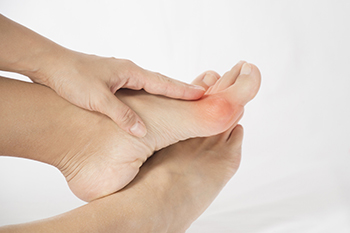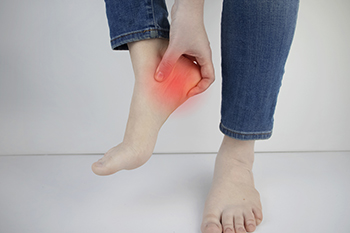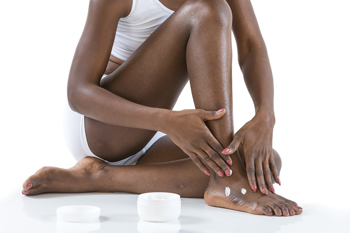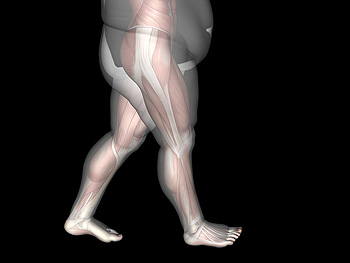January 2023
Bunions and Heredity

Bunions are essentially defined as bumps that can form on the side of the big toe or pinky toe that are bony in texture. Many patients with bunions are often interested in learning more about why they have developed this condition and what contributed to it. The answer may surprise many patients. Interestingly, heredity and genetics is one of the major contributing factors in bunions. Specifically, the shape of your foot that you inherit from your parents is a major factor that can determine your susceptibility to bunions. Unfortunately, individuals do not have control over their genetic disposition to bunions. It is estimated that more than 80 percent of individuals living with bunions have a history in their family tree of bunions. Although this may lead one to believe that they can do nothing to prevent the development of bunions, this is not technically true. There are a number of steps that an individual can take to mitigate their risk of developing bunions, such as wearing footwear that fits properly. Contact a podiatrist today for more information.
If you are suffering from bunions, contact Dawn Miles, DPM of Florida. Our doctor can provide the care you need to keep you pain-free and on your feet.
What Is a Bunion?
A bunion is formed of swollen tissue or an enlargement of boney growth, usually located at the base joint of the toe that connects to the foot. The swelling occurs due to the bones in the big toe shifting inward, which impacts the other toes of the foot. This causes the area around the base of the big toe to become inflamed and painful.
Why Do Bunions Form?
Genetics – Susceptibility to bunions are often hereditary
Stress on the feet – Poorly fitted and uncomfortable footwear that places stress on feet, such as heels, can worsen existing bunions
How Are Bunions Diagnosed?
Doctors often perform two tests – blood tests and x-rays – when trying to diagnose bunions, especially in the early stages of development. Blood tests help determine if the foot pain is being caused by something else, such as arthritis, while x-rays provide a clear picture of your bone structure to your doctor.
How Are Bunions Treated?
- Refrain from wearing heels or similar shoes that cause discomfort
- Select wider shoes that can provide more comfort and reduce pain
- Anti-inflammatory and pain management drugs
- Orthotics or foot inserts
- Surgery
If you have any questions, please feel free to contact one of our offices located in Palatka and Saint Augustine, FL . We offer the newest diagnostic and treatment technologies for all your foot care needs.
Taping For Plantar Fasciitis

Plantar Fasciitis occurs when the plantar fascia ligament, running from the heel to the toes and supporting the arch of the foot, sustains strain or tears. This condition can cause severe pain in the heel of the foot making walking and standing uncomfortable. One way to manage plantar fasciitis is taping. Plantar fasciitis tape is sometimes called low-Dye tape and using the tape for this affliction involves taping the foot and ankle to help stabilize the plantar fascia and provide arch support. This can help reduce the amount of stretching and movement of the ligament when one is on their feet and gives the plantar fascia a chance to heal. It provides short-term relief for those with plantar fasciitis and is something that can be discussed and done by a qualified podiatrist. Such a medical professional can also provide further treatment and suggestions for plantar fasciitis.
Plantar fasciitis can be very painful and inconvenient. If you are experiencing heel pain or symptoms of plantar fasciitis, contact Dawn Miles, DPM from Florida. Our doctor can provide the care you need to keep you pain-free and on your feet.
What Is Plantar Fasciitis?
Plantar fasciitis is the inflammation of the thick band of tissue that runs along the bottom of your foot, known as the plantar fascia, and causes mild to severe heel pain.
What Causes Plantar Fasciitis?
- Excessive running
- Non-supportive shoes
- Overpronation
- Repeated stretching and tearing of the plantar fascia
How Can It Be Treated?
- Conservative measures – anti-inflammatories, ice packs, stretching exercises, physical therapy, orthotic devices
- Shockwave therapy – sound waves are sent to the affected area to facilitate healing and are usually used for chronic cases of plantar fasciitis
- Surgery – usually only used as a last resort when all else fails. The plantar fascia can be surgically detached from the heel
While very treatable, plantar fasciitis is definitely not something that should be ignored. Especially in severe cases, speaking to your doctor right away is highly recommended to avoid complications and severe heel pain. Your podiatrist can work with you to provide the appropriate treatment options tailored to your condition.
If you have any questions please feel free to contact one of our offices located in Palatka and Saint Augustine, FL . We offer the newest diagnostic and treatment technologies for all your foot and ankle needs.
The Importance of Moisturizing the Feet

Taking care of the feet on a daily basis is a key part of maintaining your overall health. One of the most important ways in which an individual can care for and pamper their feet is by keeping them sufficiently moisturized. Keeping the feet moisturized protects against dry and cracked skin that might lead to conditions such as cracked heels. People may choose to apply a wide range of different moisturizers to their feet. Using moisturizing products like a glaze for the heel can help ensure that your skin on the feet feel smooth to the touch. Glazes or moisturizers may contain honey, aloe, and other moisturizing ingredients. While not all moisturizers may help you successfully get rid of calluses immediately, moisturizing the feet can nonetheless be helpful and beneficial. If you are someone that wants to take care of your feet, contact a podiatrist today about moisturizing the feet.
Proper foot care is something many older adults forget to consider. If you have any concerns about your feet and ankles, contact Dawn Miles, DPM from Florida. Our doctor can provide the care you need to keep you pain-free and on your feet.
The Elderly and Their Feet
As we age we start to notice many changes in our body, but the elder population may not notice them right away. Medical conditions may prevent the elderly to take notice of their foot health right away. Poor vision is a lead contributor to not taking action for the elderly.
Common Conditions
- Neuropathy – can reduce feeling in the feet and can hide many life-threatening medical conditions.
- Reduced flexibility – prevents the ability of proper toenail trimming, and foot cleaning. If left untreated, it may lead to further medical issues.
- Foot sores – amongst the older population can be serious before they are discovered. Some of the problematic conditions they may face are:
- Gouging toenails affecting nearby toe
- Shoes that don’t fit properly
- Pressure sores
- Loss of circulation in legs & feet
- Edema & swelling of feet and ankles
Susceptible Infections
Diabetes and poor circulation can cause general loss of sensitivity over the years, turning a simple cut into a serious issue.
If you have any questions please feel free to contact one of our offices located in Palatka and Saint Augustine, FL . We offer the newest diagnostic and treatment technologies for all your foot and ankle needs.
Obesity and Orthotics

When an individual is significantly overweight, it can become more likely that they will experience some kind of foot complication. This is largely because the increased weight essentially puts more pressure on the feet which can cause pain, discomfort, and strain. Obese individuals might be able to benefit from the use of orthotics, which are shoe inserts that are either custom-made or over-the-counter. One important consideration to keep in mind is that people struggling with obesity might benefit from orthotics that are thicker in texture and shape than what is ordinarily worn. Additionally, obese people might benefit from orthotics that are more rigid in shape. The orthotics that are more soft and pliable might not be as effective for obese individuals. This is because a thicker and more rigid orthotic device might be better situated to support the extra weight of an obese individual. If you struggle with obesity, contact a podiatrist today for assistance.
Obesity has become very problematic at this point in time and can have extremely negative effects on the feet. If you’re an obese individual and are concerned about your feet, contact Dawn Miles, DPM from Florida. Our doctor can provide the care you need to keep you pain-free and on your feet.
Obesity and Your Feet
Since your feet are what support your entire weight when standing, any additional weight can result in pain and swelling. Being overweight is one of the main contributors to foot complications.
Problems & Complications
Extra Weight – Even putting on just a few extra pounds could create serious complications for your feet. As your weight increases, your balance and body will shift, creating new stresses on your feet. This uneven weight distribution can cause pain, even while doing the simplest tasks, such as walking.
Diabetes – People who are overweight are at serious risk of developing type-2 diabetes, which has a drastic impact on the health of your feet. As you get older, your diabetes might worsen, which could lead to loss of feeling in your feet, sores, and bruises. You could also become more prone to various infections.
Plantar fasciitis – Pressure and stress that is placed on muscles, joints, and tendons can trigger plantar fasciitis, which is an inflammation of tissue that forms along the bottom of the foot.
If you have any questions please feel free to contact one of our offices located in Palatka and Saint Augustine, FL . We offer the newest diagnostic and treatment technologies for all your foot and ankle needs.
Why Live with Pain and Numbness in Your Feet?
How Dangerous Is It to Wear High Heels?

Wearing high heels can cause various foot issues in women. Corns, Morton’s neuroma, and bunions are common conditions that can happen from frequently wearing high heels, and this can be a result of not having enough room for the toes to move freely in. Some women may develop toenail fungus from the constant pressure the nails endure as they are forced to lie against the front of the shoe. Additionally, the Achilles tendon may become shorter from the angle of the shoe, which can lead to developing plantar fasciitis or heel spurs. People who wear high heels may have an increased risk of falling and incurring an ankle injury from losing their balance. An alternative for wearing these types of stylish shoes may be to choose shoes that are wider in the toe area, and have a lower heel. If you have concerns about the possible foot conditions that can develop from wearing high heels, please contact a podiatrist who can answer any questions you may have.
High heels have a history of causing foot and ankle problems. If you have any concerns about your feet or ankles, contact Dawn Miles, DPM from Florida. Our doctor can provide the care you need to keep you pain-free and on your feet.
Effects of High Heels on the Feet
High heels are popular shoes among women because of their many styles and societal appeal. Despite this, high heels can still cause many health problems if worn too frequently.
Which Parts of My Body Will Be Affected by High Heels?
- Ankle Joints
- Achilles Tendon – May shorten and stiffen with prolonged wear
- Balls of the Feet
- Knees – Heels cause the knees to bend constantly, creating stress on them
- Back – They decrease the spine’s ability to absorb shock, which may lead to back pain. The vertebrae of the lower back may compress.
What Kinds of Foot Problems Can Develop from Wearing High Heels?
- Corns
- Calluses
- Hammertoe
- Bunions
- Morton’s Neuroma
- Plantar Fasciitis
How Can I Still Wear High Heels and Maintain Foot Health?
If you want to wear high heeled shoes, make sure that you are not wearing them every day, as this will help prevent long term physical problems. Try wearing thicker heels as opposed to stilettos to distribute weight more evenly across the feet. Always make sure you are wearing the proper shoes for the right occasion, such as sneakers for exercising. If you walk to work, try carrying your heels with you and changing into them once you arrive at work. Adding inserts to your heels can help cushion your feet and absorb shock. Full foot inserts or metatarsal pads are available.
If you have any questions please feel free to contact one of our offices located in Palatka and Saint Augustine, FL . We offer the newest diagnostic and treatment technologies for all your foot and ankle needs.










